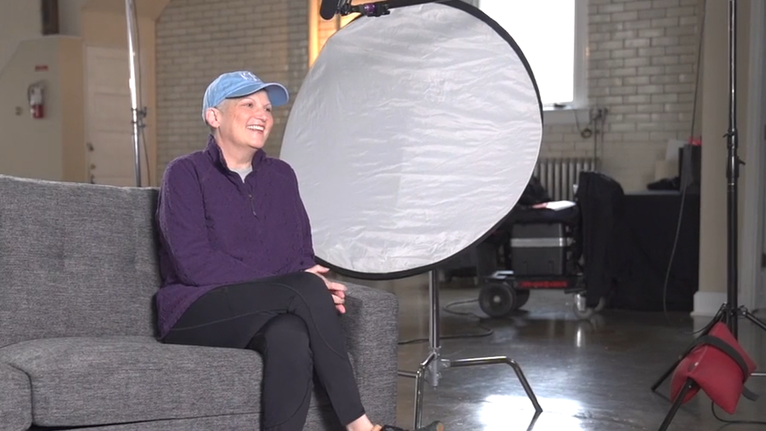Understanding Leiomyosarcoma
There are two types of uterine cancer—cancer of the lining (endometrial cancer) and a muscle tumor of the uterus (sarcoma). In Kathy’s case of leiomyosarcoma—a rare type of cancer that begins in smooth muscle tissue—it’s a cancer of the muscle fibers in the uterus, and is usually hard to diagnose.
Initially, Kathy wasn’t going to tell anyone about her cancer diagnosis. She never could have expected that her back pain was a result of cancer.
“I wasn’t able to sleep that first night after getting my diagnosis and realized I had to tell people,” Kathy said.
Kathy was referred to the University of Cincinnati Cancer Center but wasn’t familiar with it, not being from the area. She was able to speak to Dr. Jackson on a Friday afternoon, where the two reviewed her diagnosis and got her in for additional imaging.
The next part of the plan was to offer Kathy as many additional resources as she could as she began treatment for her cancer. The Cancer Center features a plethora of multidisciplinary experts who are subspecialists in all types of cancers—which can’t be found elsewhere in the region. In addition, the Cancer Center features specialists from other practices of medicine, including radiology, physical therapy and integrative health.
All of these experts are involved as part of a patient’s treatment, including Kathy’s. The Cancer Center focuses on treating the whole patient—not just the cancer.
“I quickly realized that the Cancer Center is very integrated with other disciplines,” Kathy said. “If I have questions, they always answer. They make me feel important.”
Part of Kathy’s treatment included participating in the Cancer Center’s Survivorship Program, which gives patients additional resources they can use throughout their cancer journey, even after it’s done. These resources include exercise wellness, physical therapy, yoga, massage therapy and acupuncture.
In partnership with The Osher Center for Integrative Health, the Cancer Center opened the region’s first Integrative Health & Cancer Survivorship Clinic in February 2021, which is led by Mladen Golubic, MD, PhD, UC Health physician, medical director for UC Health Integrative Health and professor of family and integrative health at the UC College of Medicine, and Melissa Erickson, MD, medical director of the Cancer Center’ Survivorship Program and an adjunct assistant professor at the UC College of Medicine.
“The Cancer Center focuses on quality of life, which is something unique,” Dr. Jackson explained. “This includes our survivorship program that helps patients better deal with their diagnosis and give them the best quality of life to lower their burden throughout their journey.”
Kathy began chemotherapy to treat her cancer, but she also participated in other services offered through the survivorship program. She participated in cancer wellness exercise, which helps treat the whole person. Following chemotherapy, she had back surgery to rebuild a disc that had collapsed as a result of the cancer. Along the way, she had immense support from family, friends and, of course, her care team.
“My friends are terrific. They know what is going on and give me the support I need,” Kathy said. “I have received an overwhelming outpour of love and support.”


